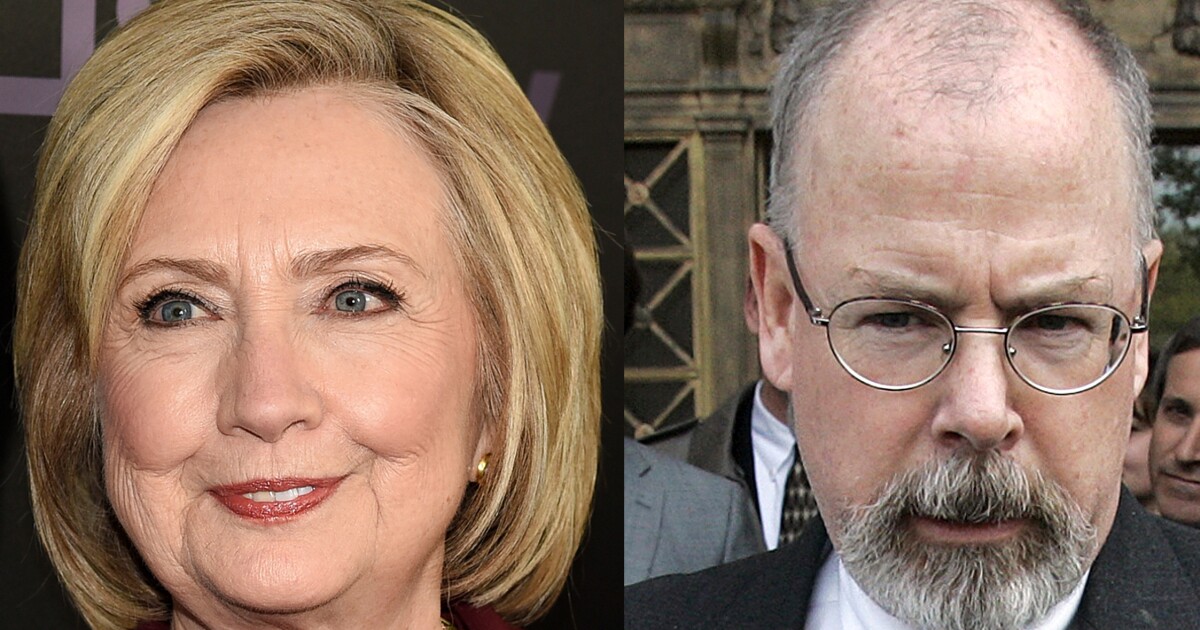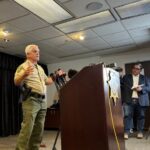

The judge in the case of Democratic cybersecurity lawyer Michael Sussmann has agreed to review dozens of records currently withheld because of assertions of attorney-client privilege by Hillary Clinton’s 2016 presidential campaign to see if they have been improperly concealed.
The agreement is a win for special counsel John Durham in his case against Sussmann, who has been indicted on charges of concealing his clients, the Clinton campaign and tech executive Rodney Joffe, from FBI general counsel James Baker when he pushed eventually debunked claims of a secret backchannel between the Trump Organization and Russia’s Alfa Bank.
Judge Christopher Cooper said Wednesday he would grant the government’s motion, arguing he did not believe it was breaking attorney-client privilege for him to review the records in dispute in an “in camera” setting, away from the public and the press.
British ex-spy Christopher Steele created a dossier on then-candidate Donald Trump after being hired by the opposition research firm Fusion GPS, which was itself hired by the Perkins Coie law firm and Marc Elias, the general counsel for Clinton’s campaign.
The judge repeatedly pointed to the difference between hiring a firm to do “fact-checking” versus hiring it to do “opposition research.”
Hillary for America, the DNC, and Perkins argue claims of attorney-client privilege should keep the records concealed and claim Fusion simply provided them legal services.
Durham is insisting those groups played a coordinated role in pushing false collusion claims.
The judge said he didn’t doubt Elias’s claims about Fusion being hired to provide legal advice but said that didn’t mean everything Fusion did in 2016 is covered by privilege. The judge said he would review the Joffe records too.
It remains to be seen how the judge will rule on the privilege claims after taking a look at the Alfa Bank-related documents. Thirty are internal Fusion emails, and eight relate to Joffe and Fusion.
CHRISTOPHER STEELE LOOMS LARGE OVER DURHAM TRIAL
Clinton’s 2016 campaign and Fusion united in court on Wednesday.
Fusion’s lawyer said the firm asserted privilege over 1,500 documents, adding it also “produced hundreds of documents.” Fusion said the Clinton campaign, DNC, and Perkins had made “judgment calls” on what was privileged.
The judge asked Durham prosecutor Jonathan Algor whether Durham would come back for the other 1,500 documents if the judge ended up agreeing with the prosecution about these 38 records. Algor said “not for this trial” but left the door open for the future, saying that “Your Honor’s decision is important” for the investigation.
Algor told the judge the Clinton campaign and Fusion wrongly “advanced a very broad and novel theory” of attorney-client privilege that “opposition research” is “somehow protected.” He pointed to Fusion emails that have been released and said “nothing shows” any of that related to “legal advice.”
Algor stressed the opposition research was pushed to the FBI, Congress, and the media.
Durham plans to call Fusion’s “tech maven,” Laura Seago, to testify, including Fusion’s role with a white paper Sussmann pushed to the FBI.
Sussmann lawyer Sean Berkowitz lamented “the government charged a case with attorneys and privilege all over the place” and called it “almost a law school hypothetical.” He said the judge’s ruling could have a “ripple effect” and could end up calling “thousands of documents into question” related to prior privilege assertions. He also said letting Seago speak at the trial would be “unduly prejudicial.”
Algor countered that the prosecution had “cabined” the trial to a single Fusion witness and a few dozen documents. He said Seago had “key evidence” about the attorney-client relationships and that she would be a Fusion witness tied to Sussmann, the Clinton campaign, and Joffe.
Clinton campaign lawyer Robert Trout argued, “The government here has an erroneously cramped view of privilege” and called it a “false choice” to say something is either opposition research or covered by privilege. He said, “It is true that Donald Trump was an opposition candidate” but claimed Fusion had been hired to help with legal advice for the campaign. He said: “It may have been research about an opposition candidate, but the real purpose was to get our facts straight.”
The Clinton campaign’s filing last week included a declaration from Elias, who claimed, “Fusion’s role was to provide consulting services” that Perkins was giving related to defamation and libel laws.
Fusion co-founders Glenn Simpson and Peter Fritsch wrote in their 2019 book that they met with Elias in April 2016.
Fritsch told Elias, “We think you guys will really want to pay attention to the Russia angle.”
“This angle was all new to Elias, and he loved it,” Fusion said.
The judge quoted from an email by Fritsch to a reporter in October 2016 in which the Fusion co-founder said to “do the f***ing Alfa bank secret comms story.”
The judge said: “How is that assisting Mr. Elias providing legal advice? … That is assisting a media strategy.”
The judge said he was “not convinced” that the Clinton campaign should just have a blanket assertion of privilege.
Trout contended the prosecution’s arguments suggested “Mr. Elias’s sworn statements are not to be believed, and I don’t think that’s appropriate.”
The judge again made a “distinction between” fact-checking and disseminating opposition research.
CLICK HERE TO READ MORE FROM THE WASHINGTON EXAMINER
Fusion’s lawyer also argued the firm had no knowledge of Sussmann’s meeting with the FBI and tried to argue it was irrelevant to the indictment.







